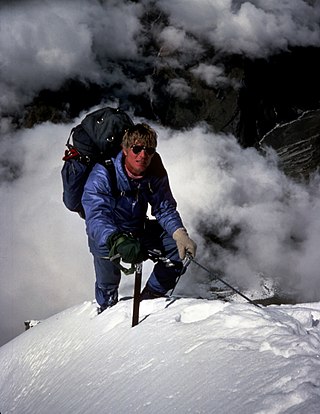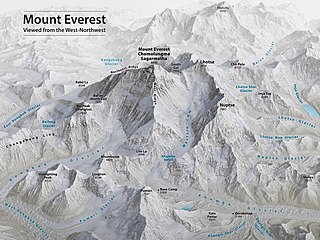Related Research Articles

Mount Everest, known locally as Sagarmatha or Qomolangma, is Earth's highest mountain above sea level, located in the Mahalangur Himal sub-range of the Himalayas. The China–Nepal border runs across its summit point. Its elevation of 8,848.86 m was most recently established in 2020 by the Chinese and Nepali authorities.

George Herbert Leigh-Mallory was an English mountaineer who participated in the first three British Mount Everest expeditions in the early 1920s. He and climbing partner Andrew "Sandy" Irvine were last seen ascending near Everest's summit during the 1924 expedition, sparking debate as to whether they reached it before they died.
Laurie Skreslet is a Canadian mountaineer best known for his ascent of Mount Everest.

Scott Eugene Fischer was an American mountaineer and mountain guide. He was renowned for ascending the world's highest mountains without supplemental oxygen. Fischer and Wally Berg were the first Americans to summit Lhotse, the world's fourth highest peak. Fischer, Charley Mace, and Ed Viesturs summitted K2 without supplemental oxygen. Fischer first climbed Mount Everest in 1994 and later died during the 1996 blizzard on Everest while descending from the peak.

Edmund Viesturs is an American high-altitude mountaineer, corporate speaker, and well known author in the mountain climbing community. He was the first American to climb all 14 of the eight-thousander mountains, and the 5th person to do so without supplemental oxygen. Along with Apa Sherpa, he has summitted eight-thousanders on 21 occasions, including Mount Everest seven times.

Robert Edwin Hall was a New Zealand mountaineer. He was the head guide of a 1996 Mount Everest expedition during which he, a fellow guide, and two clients died. A best-selling account of the expedition was given in Jon Krakauer's book Into Thin Air and the expedition was dramatised in the 2015 film Everest. At the time of his death, Hall had just completed his fifth ascent to the summit of Everest, more at that time than any other non-Sherpa mountaineer.

The Kangshung Face or East Face is the eastern-facing side of Mount Everest, one of the Tibetan sides of the mountain. It is 3,350 metres (11,000 ft) from its base on the Kangshung Glacier to the summit. It is a broad face, topped on the right by the upper Northeast Ridge, and on the left by the Southeast Ridge and the South Col. Most of the upper part of the face is composed of hanging glaciers, while the lower part consists of steep rock buttresses with couloirs between them. The steep southern third of the Kangshung Face also comprises the Northeastern Face of Lhotse; this section may be considered a separate face altogether following the division of the South "Neverest" Buttress up to the South Col. It is considered a dangerous route of ascent, compared to the standard North Col and South Col routes, and it is the most remote face of the mountain, with a longer approach.

Mount Everest is the world's highest mountain, with a peak at 8,849 metres (29,031.7 ft) above sea level. It is situated in the Himalayan range of Solukhumbu district, Nepal.
Lincoln Rossl Hall OAM was a veteran Australian mountain climber, adventurer and author. Lincoln was part of the first Australian expedition to climb Mount Everest in 1984, which successfully forged a new route. He reached the summit of the mountain on his second attempt in 2006, miraculously surviving the night at 8,700 m (28,543 ft) on descent, after his family was told he had died.

The 1996 Mount Everest disaster occurred on 10–11 May 1996 when eight climbers caught in a blizzard died on Mount Everest while attempting to descend from the summit. Over the entire season, 12 people died trying to reach the summit, making it the deadliest season on Mount Everest at the time and the third deadliest after the 23 fatalities resulting from avalanches caused by the April 2015 Nepal earthquake and the 16 fatalities of the 2014 Mount Everest avalanche. The 1996 disaster received widespread publicity and raised questions about the commercialization of Everest.

The 1924 British Mount Everest expedition was—after the 1922 British Mount Everest expedition—the 2nd expedition with the goal of achieving the first ascent of Mount Everest. After two summit attempts in which Edward Norton set a world altitude record of 8,572.8 metres (28,126 ft), the mountaineers George Mallory and Andrew "Sandy" Irvine disappeared on the third attempt. Their disappearance has given rise to the long-standing speculation of whether or not the pair might – under a narrow set of assumptions – have reached the summit. Mallory's body was found in 1999 at 8,156 metres (26,760 ft), but the resulting clues did not provide any conclusive evidence as to whether the summit was reached. Irvine's partial remains were later found in 2024 by a National Geographic team during a descent of the Rongbuk Glacier by the north face.

The 1922 British Mount Everest expedition was the first mountaineering expedition with the express aim of making the first ascent of Mount Everest. It was also the first expedition that used bottled oxygen while climbing Everest. The attempt was made from the northern side of Everest out of Tibet. At the time, Everest could not be attempted from the south out of Nepal as the country was closed to Western foreigners.
Robert Douglas "Rob" Gauntlett was an English adventurer, explorer and motivational speaker. In 2006 he became the youngest British climber to reach the summit of Everest.
Jamie Clarke is a Canadian mountaineer, author, filmmaker, actor, and public speaker. He has stood on top of Mount Everest twice in 1997 and 2010, climbed the Seven Summits, and is one of the few westerners who have crossed The Empty Quarter on camels. In 2019, Clarke crossed the Mongolian desert, travelling east to west, with his son Khobe. They travelled on motorbikes, then summited Khüiten Peak, the highest mountain in Mongolia.

The 1933 British Mount Everest expedition was, after the reconnaissance expedition of 1921, and the 1922 and 1924 expeditions, the fourth British expedition to Mount Everest and the third with the intention of making the first ascent.

Major General John Geoffrey Bruce was an officer in the British Indian Army, eventually becoming Deputy Chief of General Staff, who participated in the 1922 British Mount Everest expedition. Bruce, who had never before climbed a mountain, had been appointed as a transport officer, but chance led to him accompanying George Finch on the only summit attempt that used supplemental oxygen. Together they set a new mountaineering world record height of 27,300 ft (8,321 m), only 1,731.7 ft (527.82 m) below the summit of Mount Everest. He also took part in the 1924 British Mount Everest expedition, and for a time was slated to make the first summit attempt with George Mallory, before the party was forced to retreat and Mallory subsequently went for the top with Sandy Irvine.
Shriya Shah-Klorfine was a Nepal-born Canadian woman who died while descending from the summit of Mount Everest in 2012.

Mount Everest climbing season included 245 summits on May 19, 2012, a record number of summits on a single day. It would take seven more years to break this record. This added congestion resulted in the highest fatality total since 1996. 683 climbers from 34 countries attempted to climb the mountain, and 547 people summited. A record was set in May when 234 climbers summitted on a single day. There were 11 deaths, some of which were attributed to overcrowding near the peak.
References
- ↑ "ScreenDoor - Everest!". Archived from the original on 2008-11-05. Retrieved 2008-11-20.
